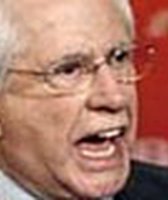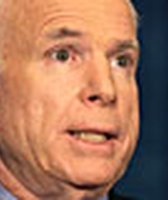Stand up for the facts!
Our only agenda is to publish the truth so you can be an informed participant in democracy.
We need your help.
I would like to contribute
SUMMARY: Mitt Romney says he's following the same path as Ronald Reagan, Henry Hyde and George H.W. Bush when it comes to changing positions on abortion, but his turn was sharper than theirs.
As a candidate for the U.S. Senate in 1994, Mitt Romney said during a televised debate: "I believe that abortion should be safe and legal in this country."
As a candidate for president in 2007, Romney said, "I'm prolife. I'm not going to apologize for becoming prolife. Ronald Reagan followed that same course, as did Henry Hyde and George Herbert Walker Bush. And I'm proud to be prolife."
In citing three prominent Republican figures, Romney makes the case that his flip-flop on this divisive issue is unremarkable. However, Reagan, Hyde and Bush made shifts far less stark than Romney's.
We examined Romney's abortion record here. After supporting abortion rights early in his political career, he changed his mind after meeting a stem-cell researcher in 2004.
Let's take the others one at a time.
As governor of California in 1967, Ronald Reagan signed into law a bill legalizing "therapeutic" abortions, defined as those approved by medical staff where there is substantial risk to the physical and mental health of the woman, or the pregnancy is the result of rape or incest.
Biographer Lou Cannon, in his 2001 book Ronald Reagan: The Presidential Portfolio, writes that it was a difficult decision.
"Reagan did not know what to do," Cannon writes. "His staff was divided (also largely on religious lines), and he was lobbied heavily from both sides. … After several days of indecision, Reagan reluctantly signed the Therapeutic Abortion Act. He did not anticipate that some 2-million abortions would be performed as a result, most of them because of a provision in the bill allowing abortions to protect the mental health of the mother. … After he recognized its consequences, he became an opponent of abortions, except to save the life of the mother or in cases of rape or incest."
In a December 2007 interview with PolitiFact, Cannon said: "Governor Reagan had never considered this issue before. Few people had. It simply wasn't a political issue on the table."
It was the only time Cannon remembers Reagan saying, "I did the wrong thing."
Thirteen years later, Reagan ran for president under a platform that included strong opposition to abortion.
Now, the case of Henry Hyde. In the early 1970s, in the Illinois legislature, Hyde initially was receptive to a colleague's request that he co-sponsor a bill relaxing the state's ban on abortion. But after he read up on the issue, he declined.
"I had never really thought about abortion, so I read the bill and read a book: The Vanishing Right to Live , by Charlie Rice. I became convinced that abortion was an evil," Hyde says in a 2006 National Review article, "Hyde in Winter," by John J. Miller.
Hyde did not support the bill, rather he helped defeat it. As he went on to Congress, he became a strong opponent of abortion, winning passage in 1976 of what became known as the Hyde Amendment barring the use of federal funds for abortion.
When he died in November 2007, the National Right-to-Life Committee called Hyde "the father of the modern prolife movement."
George H.W. Bush's position on abortion was an issue as Reagan considered him as a running mate in 1980.
"While he personally opposes abortion, he is against passing a constitutional amendment to make it illegal," a Newsweek article said of Bush that year.
Reagan, running on a strict antiabortion platform, needed a vice presidential candidate who was right there with him. Richard Allen, Reagan's foreign policy adviser at the time and later national security adviser, writes about the angst in the Reagan camp in an article for the New York Times .
" 'There's Bush,' I suggested, half expecting him to close off the discussion. Instead he paused and then said, 'I can't take him; that "voodoo economic policy" charge and his stand on abortion are wrong.' "
Allen goes on to say that Bush was approached by Reagan himself about whether he could pledge to support the platform. That was the beginning of Bush's unwavering antiabortion stand.
Planned Parenthood says Bush "turned his back on reproductive health care to be Reagan's running mate," while the National Right-to-Life Committee endorsed him for president in 1988.
So, where does that leave us? Reagan had an abortion-rights moment early in his career. Hyde briefly considered backing the abortion bill of a colleague. Bush at one time opposed outlawing abortion.
It's difficult to compare records on abortion because of the way the political landscape and dialogue has changed over the years. Still, none of the three politicians Romney cites made so clear a change as he did. But he's right to suggest each struggled with the issue.
Our Sources
Ronald Reagan, "Abortion and the Conscience of the Nation," 1983 in The Human Life Review
Information & Knowledge for Optimal Health (INFO) Project, "Therapeutic abortion Act of 1967"
"Ronald Reagan: The Presidential Portfolio," by Lou Cannon, 2001
Interview with Lou Cannon, Reagan biographer
National Review, "Hyde in winter," by John J. Miller, Dec. 31, 2006
Chicago Tribune, "Hyde: 'I just want to leave the room with my dignity,' " by Mike Dorning, June 9, 2002
Chicago Sun-Times, "Former Congressman, Clinton foe, Henry Hyde dies," by Abdon M. Pallasch and Lynn Sweet, Nov. 29, 2007
New York Times, "George Herbert Walker Bush; The Accidental Vice President," by Richard V. Allen, July 30, 2000
Newsweek, "Bush Breaks Out of the Pack," Feb. 4, 1980
Planned Parenthood, "Rating the Presidents, 1916–2006," by Amy Bryant
The Atlantic, "A visit with George Bush," by Richard Brookhiser, August 1992
The Daily Standard, "How prolifers become prolifers," by Fred Barnes, Sept. 1, 2006












































